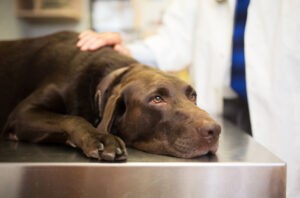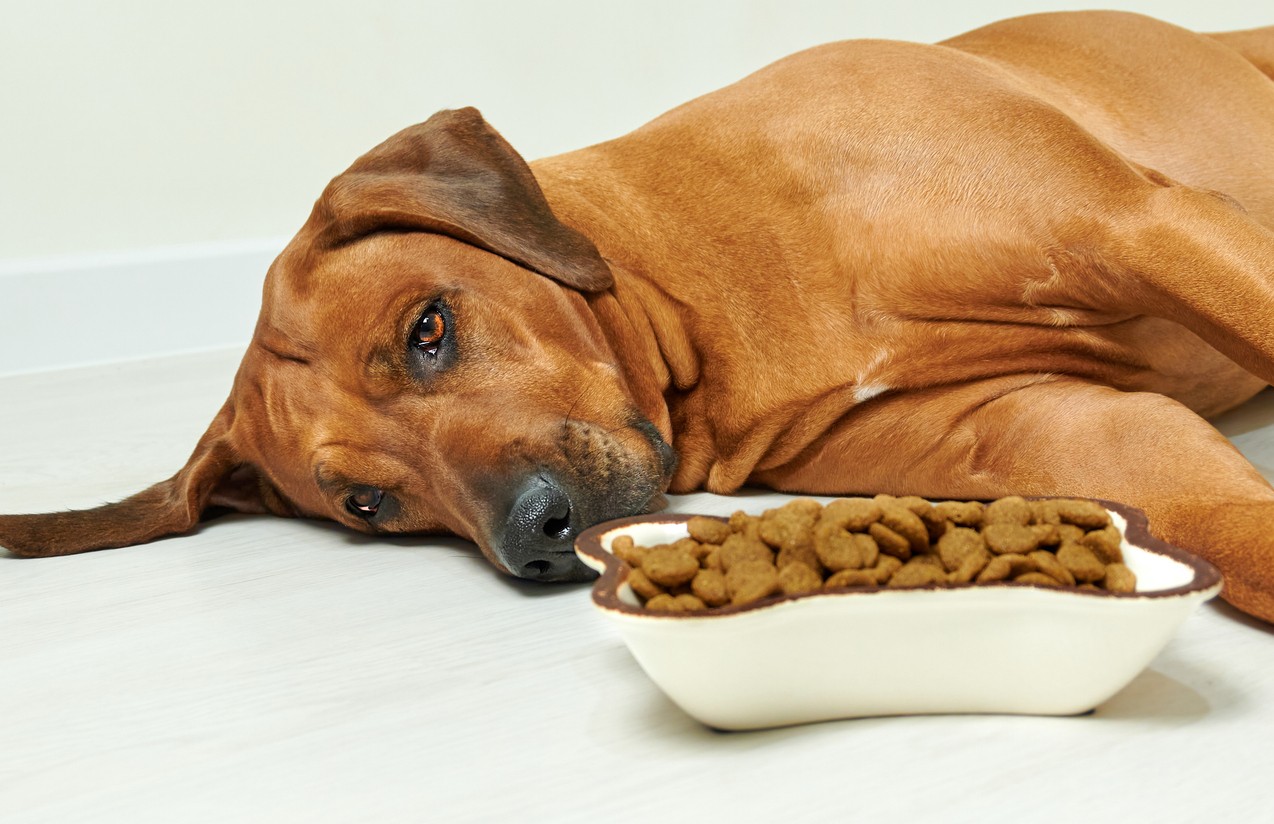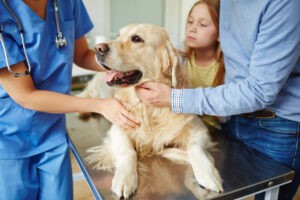Gastroenteritis is a common condition in dogs that causes inflammation of the gastrointestinal tract, leading to symptoms like vomiting, diarrhea, and abdominal discomfort. In this in-depth guide, we explore the causes, symptoms, and treatment options for gastroenteritis, helping dog owners understand how to best manage this condition.
Whether your dog is dealing with a sudden bout of illness or a chronic issue, understanding gastroenteritis is key to ensuring they receive the right care at the right time.
What is Gastroenteritis?
Gastroenteritis in dogs involves the inflammation of both the stomach and intestinal lining, resulting in acute or chronic digestive upset.
- Acute gastroenteritis emerges suddenly and is typically triggered by dietary indiscretion, infections, ingestion of foreign objects, or toxins, leading to severe symptoms like vomiting and diarrhea.
- Chronic gastroenteritis, on the other hand, develops gradually and may result from ongoing health issues such as allergies, hormonal imbalances, or chronic infections.
Both forms can significantly impact a dog’s health, presenting a variety of symptoms that require prompt and effective management to reduce your pet’s discomfort and prevent serious complications. An experienced veterinary professional can pinpoint the specific specific type and triggers of gastroenteritis in your dog, and then use that information to decide the best treatment and care.
Signs and Symptoms of Gastroenteritis in Dogs
If you’re able to identify the signs of gastroenteritis in dogs, you can take quick action and potentially prevent dangerous complications. Common gastroenteritis symptoms in dogs include:
- Vomiting: Dogs with gastroenteritis may vomit frequently, expelling bile or remnants of undigested food.
- Diarrhea: The condition often causes severe diarrhea, which may include the presence of mucus or blood, signaling irritation or damage to the intestinal lining.
- Lethargy: Affected dogs typically exhibit reduced energy levels and a marked disinterest in usual activities or play.
- Abdominal Pain: Sensitive or painful reactions to belly touches can indicate discomfort; dogs might whine, growl, or attempt to avoid contact.
- Dehydration: Symptoms of dehydration include dry and tacky gums and increased thirst, as the body attempts to compensate for fluid loss.
- Fever: A mild to moderate fever often accompanies gastroenteritis, reflecting the body’s immune response to the infection.
There are also certain symptoms that are often less common, but are still considered a red flag that your dog needs professional veterinary care:
- Weight Loss: In chronic cases of gastroenteritis, dogs might experience noticeable weight loss due to poor absorption of nutrients.
- Increased Salivation: Excessive drooling can occur, often as a response to nausea or stomach upset.
- Regurgitation: This involves the passive expulsion of undigested food from the esophagus, which is different from the forceful expulsion seen with vomiting.
- Change in Stool Color: A significant symptom to watch for is a change in the color of the stool; dark or greyscale stools can indicate internal bleeding.

What’s the Difference Between Vomiting and Regurgitation?
As you observe your dog for potential signs of gastroenteritis, keep in mind that there are key differences when it comes to vomiting vs. regurgitation.
- Vomiting is an active process in which the dog exhibits abdominal contractions and may show signs of nausea, such as drooling or retching, before expelling stomach contents. This can be a sign of gastrointestinal upset or infection.
- Regurgitation occurs without any prior signs of distress and involves no abdominal effort or contractions. The food or fluid comes up effortlessly and is usually in the same condition as when it was swallowed, indicating it has not been digested. This typically points to problems with the esophagus, such as a blockage or a condition like megaesophagus, where the esophagus is enlarged and fails to move food to the stomach effectively.
Recognizing these differences will make it much easier for your dog to receive the correct diagnosis and treatment.
How is Gastroenteritis Diagnosed?
Diagnosing gastroenteritis in dogs starts with a full review of the dog’s medical history, as well as a detailed physical exam.
Based on the initial findings, veterinarians typically proceed with several diagnostic tests:
- Blood Tests: These are crucial to evaluate the dog’s overall health. Blood tests can reveal key indicators such as levels of dehydration, the presence of an infection, and how well vital organs are functioning. This information is essential for assessing the severity of gastroenteritis and planning an appropriate treatment strategy.
- Fecal Tests: These tests are performed to detect the presence of parasites or bacteria that might be causing gastroenteritis. Analyzing a stool sample can help identify culprits like Giardia or parvovirus, which are common causes of diarrhea in dogs.
- Imaging: Diagnostic imaging, including X-rays or ultrasound, is used to visualize the internal structure of the gastrointestinal tract. This allows veterinarians to look for any physical blockages, such as swallowed objects, or structural abnormalities like tumors or thickened bowel linings. These images are vital for ruling out conditions that might mimic gastroenteritis symptoms.
By using these diagnostic tools, veterinarians can accurately determine the cause of a dog’s symptoms and tailor a treatment plan that addresses the specific underlying issues. This approach ensures that all potential causes are considered and addressed appropriately.
What are Some of the Causes of Gastroenteritis?
Gastroenteritis in dogs can have many different triggers, each influencing the gastrointestinal tract differently and requiring specific treatment approaches:
- Eating the Wrong Foods or Foreign Materials: Dogs often eat things they shouldn’t, such as table scraps, garbage, or decomposed material they find outside. These items can upset their stomachs or introduce pathogens, leading to inflammation of the stomach and intestines or blockage.
- Infections: Gastroenteritis can be caused by a range of infectious agents. Viral infections like parvovirus are particularly severe, while bacterial infections could stem from organisms like Salmonella or E. coli. Parasitic infections, including giardia or worms, also lead to similar symptoms.
- Toxins: Dogs may ingest toxins present in household chemicals, certain plants, or even toxins produced by bacteria in spoiled food. These substances can severely irritate the gastrointestinal lining and disrupt its function.
- Chronic Diseases: Conditions such as pancreatitis involve inflammation of the pancreas and often co-occur with gastroenteritis, exacerbating symptoms. Inflammatory bowel disease (IBD) can also lead to recurring episodes of gastroenteritis by chronically inflaming the gastrointestinal tract.
Treatment for Gastroenteritis in Dogs
Treating gastroenteritis in dogs requires a comprehensive approach that is tailored to the individual needs of each pet. The veterinarian will develop a treatment plan based on the specific cause and severity of the symptoms and may adjust this plan as the treatment progresses and the dog’s response is monitored.
- Hydration: Fluid therapy is essential to combat dehydration and restore electrolyte balance. This can be administered orally, subcutaneously, or intravenously, depending on the severity.
- Dietary Management: Initially, food may be withheld for a period to rest the stomach. Gradually, a bland, low-fat diet is introduced to ease the gastrointestinal tract back into normal function.
- Medications: Depending on the cause, medications such as anti-emetics to control vomiting, antidiarrheals to manage stool consistency, and antibiotics to treat bacterial infections may be prescribed.
- Probiotics: These are recommended to help restore the natural balance of flora in the intestines, which can be disrupted by gastroenteritis.
- Pain Relief: If the dog is experiencing discomfort, appropriate pain relief medications will be provided to ensure comfort.
- Surgical intervention: In the case your pet ingests foreign material that cannot move easily through the intestinal tract, surgery to remove it may be needed.
The veterinarian will provide specific guidance and may suggest adjustments based on how the dog responds to the initial treatment. It’s important for pet owners to closely follow the vet’s instructions and schedule follow-up visits to ensure the best outcome for their dog.
Prognosis & Prevention
There’s good news if your dog is diagnosed with acute gastroenteritis – the prognosis is usually very good, so long as they receive appropriate and timely medical intervention. With the right treatment plan in place, specifically one that addresses the underlying cause of the condition, recovery is usually steady.
To avoid future occurrences, prevention plays a crucial role. Ensuring your dog maintains a balanced diet is fundamental; sudden changes in their food can disrupt their digestive system and should be avoided. Also, close supervision is essential to prevent dogs from scavenging or consuming harmful substances or objects that could trigger gastroenteritis.
Regular veterinary visits are also vital. These check-ups not only help in keeping your dog’s vaccinations up to date but also allow for early detection and management of potential health issues. By following these preventative measures, the risk of gastroenteritis can be significantly minimized, promoting a healthier and more stable digestive system for your dog.
Need Immediate Veterinary Care? Find an UrgentVet Location Near You!
If your dog shows signs of gastroenteritis, don’t wait. Immediate veterinary care can prevent complications and ensure a quick recovery, minimizing the amount of time your dog is feeling ill and uncomfortable.
Visit your nearest UrgentVet clinic for comprehensive and compassionate care tailored to your dog’s needs, including treatment for dog gastroenteritis and a wide range of other illnesses and injuries. Open 365 days per year and providing affordable urgent vet care services, we accept both walk-ins and online reservations – making it easy to help your pet feel better as soon as possible.
Locate the UrgentVet near you now!







